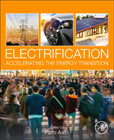
Often cited as the 'new oil', electrification is a recognized pathway to global climate neutrality. Accelerating this process remains a formidable global challenge, requiring close international coordination and collaboration between a wide range of actors in the countries concerned. Such actors need to make several well-informed choices on various part-solutions, and for this end, overcome their group interests, cooperate and successfully 'play the game' of transition. To support this considerable effort, Electrification: Accelerating the Transition to Climate Neutrality offers a widely applicable framework to delineate context-sensitive pathways by which this transition can be accelerated and what types of processes and structures may hinder the progress towards this goal. This framework draws insights from well-established literatures, ranging from technological studies to socio-technical studies of energy transitions, on to strategic niche management approaches, (international) political economy approaches and institutionalist literatures while also adopting wider social theoretical ideas from structuration theory. Contributors discuss a multitude of case studies drawn from global examples of electrification projects using a similar structure. They survey the available literature to offer the 'big picture' in their given domain, then introduce brief case studies and text boxes concretizing how to further transition in that domain and within a given geographical context mindful of the possible technological, infrastructural and societal structures that may exercise significant powers vis-à-vis the prospects of transition; followed by lessons learned for the creation of new paths and the policies likely to help with that goal. Towards the end of the book, contributors offer insight into modelling methodologies on how to pull the various solutions together. Proposes a globally applicable, inclusive framework linking together several literatures of energy transition research ranging from the social sciences to law and engineeringAssesses the regional and national applicability of solutions, enquiring into the societal structures and interests shaping the prospects of their implementationExtends the analysis from technological and infrastructural solutions to the policies required for accelerating the transition and involving the whole societyIntroduces several country level case studies demonstrating how to harness niches of innovation, kick-start the adoption of a solution, and mainstream it INDICE: Part I: Framework for transition to electrification 1. Introduction to Electrification and the Energy Transition 2. From global to local solutions in Electrification 3. Turning technological solutions to practice in the Electrification process: the leverage of policies Part II: Part-solutions 4. How can society accelerate renewable energy production through electrification? 5. How to manage a system with a high amount of intermittent renewable power? The role of back-up solutions and energy storage 6. Towards smarter and more flexible electricity grids 7. Policies for climate neutral road transport systems 8. Energy efficiency of buildings: policies, decentralised solutions and building owners 9. From consumers to prosumers in energy and electricity markets 10. Anticipating future trends Part III: Combining part-solutions 11. Combining electrification solutions in a national context 12. Managing the Nordic electric energy system 13. Electrification roadmap for transitioning to a climate neutral power system
- ISBN: 978-0-12-822143-3
- Editorial: Academic Press
- Encuadernacion: Rústica
- Páginas: 316
- Fecha Publicación: 01/05/2021
- Nº Volúmenes: 1
- Idioma: Inglés
